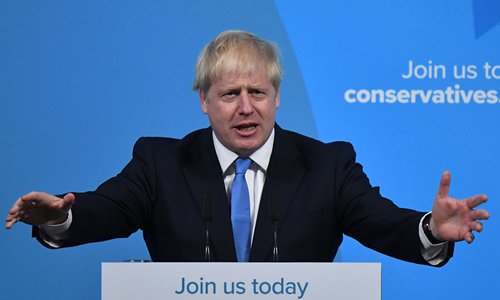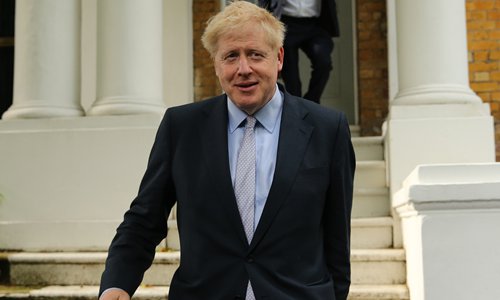‘Golden era’ of China-UK ties faces test under new PM
HK must be bridge, rather than hindrance to China-UK ties: analyst

New Conservative Party leader and incoming prime minister Boris Johnson speaks after winning the Conservative Party leadership contest in London on Tuesday. He is expected to be confirmed as prime minister on Wednesday, when his predecessor Theresa May formally tenders her resignation to Queen Elizabeth II. Photo: AFP
Boris Johnson was elected leader of Britain's ruling Conservative Party by Tory members on Tuesday and will formally take over as prime minister on Wednesday.
Johnson, a former London mayor who resigned as foreign secretary a year ago over the Brexit plans of his predecessor Theresa May, will face a tough task navigating the country out of the Brexit mire, repairing US and European relations and handling the row with Iran.
But for the new successor of 10 Downing Street, another pressing issue is how to manage China relations and continue the "golden era" of bilateral ties.
UK meddling hurts ties
Chinese analysts noted that relations with China cooled with the United Kingdom's interference in Hong Kong affairs, notably Foreign Secretary Jeremy Hunt on July 1, who urged China not to use the protests in Hong Kong as a "pretext for repression."
Multiple violent demonstrations took place in Hong Kong in July with serious clashes between protesters and the police.
The turbulence was triggered by an extradition bill that could allow criminal suspects to be taken to the Chinese mainland for trial.
The UK handed Hong Kong back to China in 1997 after more than 150 years of colonial rule. But London has kept an eye on its former colony and interfered in China's central government's governance of Hong Kong, analysts noted.
The incoming prime minister has also talked tough on Hong Kong.
Hundreds of protesters stormed the Legislative Council of Hong Kong on July 1, the anniversary of the handover.
China's Foreign Ministry condemned the act as "grave illegal activities that trample on the rule of law and undermine social order."
In an interview with Reuters, Johnson said he supported the protesters and would "happily" speak up for them and back them "every inch of the way."
China's Ministry of Foreign Affairs and the liaison office of the central government in Hong Kong have several times condemned UK interference in Hong Kong affairs.
He Zhigao, a research fellow at the Institute of European Studies, Chinese Academy of Social Sciences in Beijing, told the Global Times that the UK's attitude toward Hong Kong is the result of a colonialist mentality and Western arrogance and interference.
He noted that despite close trade relations and the fact that the UK was the first country to join the China-initiated Asian Infrastructure Investment Bank, the "golden era" of bilateral relations which began under former UK Prime Minister David Cameron and promoted by May, may come to an end.
"The UK's stance has damaged the consensus between the Chinese and UK governments over Hong Kong and broken the foundation of mutual trust," He said.
"The new prime minister must respect the 1984 Sino-British Joint Declaration and make Hong Kong a bridge, rather than hindrance, of China-UK ties."
With uncertainties looming large over Brexit and US ties in flux after the leaking of secret diplomatic cables from former British ambassador to the US Kim Darroch who described the White House as inept and dysfunctional, the UK needs to expand cooperation with other partners, said Wang Zhanpeng, a professor from the British Studies Centre of Beijing Foreign Studies University.
"The UK is good at diplomatic balance. Although Johnson is seen as pro-US, he attaches importance to pragmatic interests," Wang told the Global Times.
"He will lead the UK to continue to work with China in sectors such as finance and services. If the UK leaves the EU, there may be room for a start to talks on a China-UK free trade agreement."

File photo of Boris Johnson. Photo: AFP
Huawei row
Whether the new British government will allow Chinese company Huawei to play a role in providing the country's 5G network infrastructure is another test for ties, analysts warned.
On Monday, a decision was postponed on whether Huawei should be excluded from the rollout of 5G networks in the UK, with UK Culture Secretary Jeremy Wright saying the government is "not yet in a position" to decide.
Huawei Vice President Victor Zhang reportedly said the company was confident "that we can continue to work with network operations to roll out 5G across the UK."
BBC technology correspondent Rory Cellan-Jones noted in a report that the UK government is still not clear what the US blacklisting of Huawei really means.
Johnson must draw a fine line that requires "nifty diplomacy," said George Tzogopoulos, director of EU-China programs at the European Institute in Nice, France.
"The UK will navigate between its special relationship with the US and its appreciation of the technological advancement of the Chinese telecommunication colossus," Tzogopoulos said.
"It's a difficult decision. I see all this debate not as a zero-sum game but as an indication of China's success."
Oliver Turner, a professor from the University of Edinburgh, shared similar views. He told the Global Times that the uncertainty of Brexit would complicate the UK's choice over Huawei, "which only highlights the dangers of Brexit for the UK as it increasingly finds itself caught in the crosswinds of US-China tensions."